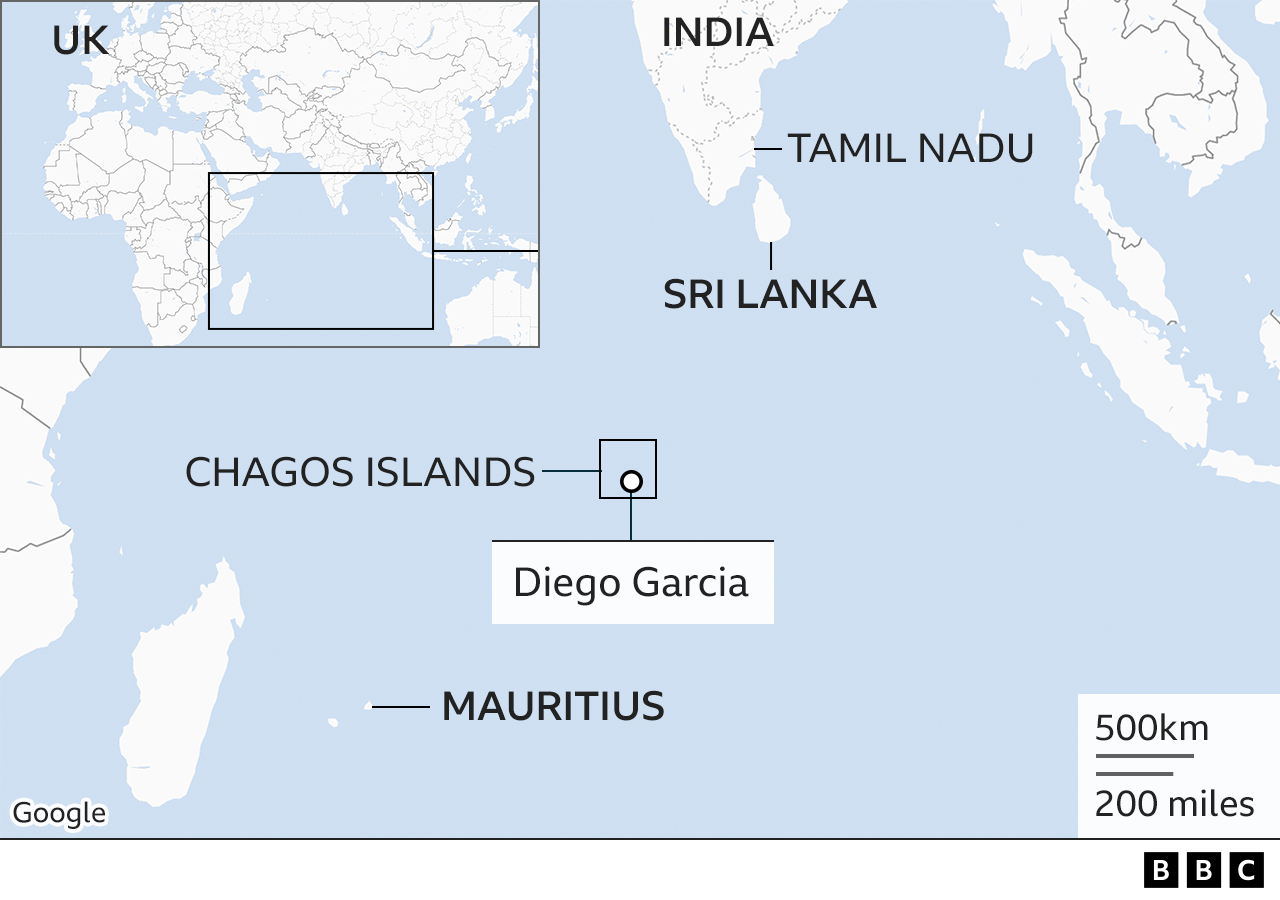Description

Disclaimer: Copyright infringement not intended.
Context: The situation of asylum seekers stranded on the island of Diego Garcia, which hosts a secretive UK-US military base.
Details
- In October 2021, a fishing boat carrying 89 Sri Lankan Tamils seeking asylum was spotted near the secretive UK-US military base on Diego Garcia.
- The migrants were en route to Canada but were forced off course due to rough weather and engine problems.
- Communication between officials reveals the challenges faced in handling the unprecedented arrival.
Arrival and Seeking Asylum:
- The boat attracted attention due to its proximity to the Diego Garcia military base, a forbidden area for unauthorized visitors.
- The migrants presented a letter expressing their wish to seek asylum in a safe country, citing persecution and fleeing from Tamil Nadu, India.
- The arrival marked the first time asylum was sought on the British Indian Ocean Territory (BIOT).
Living Conditions and Allegations:
- The migrants were temporarily accommodated on the island, which they soon described as a difficult and distressing place.
- Allegations of sexual assault, suicide attempts, self-harm, and mistreatment emerged within the camp.
- Hunger strikes, limited access to communication, and confiscation of phones were reported.
Legal Challenges and International Law:
- Lawyers representing the migrants launched a judicial review, questioning the lawfulness of the asylum process in BIOT.
- Decisions regarding returning migrants to Sri Lanka or a safe third country were based on initial interviews and translation errors, raising concerns about fairness.
- The UK government stated that BIOT is constitutionally separate from the UK, and international refugee laws do not directly apply.
Response and Concerns:
- The UK government pledged to find a long-term solution to the migrants' situation while considering their protection claims under BIOT law and international obligations.
- The United Nations High Commissioner for Refugees (UNHCR) expressed concerns about the deteriorating health situation and requested access to the migrants.
- Human Rights Watch called on the British government to ensure the welfare of asylum seekers under its control.
Evacuation and Medical Treatment:
- Three migrants were evacuated to Rwanda for medical treatment following self-harm and suicide attempts, separate from the UK-Rwanda asylum agreement.
- Four migrants had their claims approved to be sent to a safe third country.
- The UK government confirmed it would not accept any of the approved Diego Garcia asylum seekers.
- After 20 months, the asylum seekers on Diego Garcia are still waiting for a resolution, with no clear timeframe for finding a safe third country.
- The situation has taken a toll on the migrants' hope and well-being, while legal processes and disputes continue.
- Efforts by international organizations and legal representatives aim to ensure the migrants' rights and advocate for their welfare.

About Climate Induced Migration
- Climate-induced migration refers to the displacement of people primarily as a result of environmental factors linked to climate change.
Causes of climate-induced migration include:
a) Rising sea levels and coastal erosion
b) Extreme weather events (e.g., hurricanes, floods, droughts)
c) Desertification and land degradation
d) Declining agricultural productivity
e) Loss of freshwater sources
f) Melting glaciers and water scarcity
Push and Pull Factors:
- Push factors: These are environmental conditions that force people to leave their homes, such as natural disasters, loss of arable land, and lack of access to water resources.
- Pull factors: These are conditions in destination areas that attract climate migrants, such as availability of resources, job opportunities, and better living conditions.
Scope and Scale:
- Climate-induced migration is a global phenomenon affecting both developing and developed countries.
- The Intergovernmental Panel on Climate Change (IPCC) estimates that by 2050, climate change could displace hundreds of millions of people worldwide.
Impacts on Communities and Individuals:
- Loss of homes and assets: Climate-induced migration often involves the abandonment or destruction of homes and property.
- Social and cultural disruptions: Migrants may face challenges in adapting to new communities, resulting in the loss of social ties and cultural traditions.
- Health risks: Migration can expose individuals to new health risks, including increased vulnerability to diseases and inadequate access to healthcare services.
Challenges and Responses:
- Lack of legal frameworks: There is a need for international and national legal frameworks to address the specific needs and rights of climate migrants.
- Access to resources and services: Adequate provisions should be made to ensure that climate migrants have access to basic services, including food, water, shelter, and healthcare.
- Adaptation and mitigation efforts: Implementing effective climate change adaptation and mitigation strategies can help reduce the scale of climate-induced migration by preserving livelihoods and ecosystems.
International Cooperation:
- Addressing climate-induced migration requires international cooperation, including sharing knowledge, resources, and best practices.
- Collaborative efforts can focus on supporting vulnerable communities, promoting sustainable development, and reducing greenhouse gas emissions.
Policy and Planning:
- Governments need to develop comprehensive policies and plans that integrate climate-induced migration into national strategies on climate change, disaster risk reduction, and sustainable development.
- Planning should include measures to enhance resilience, provide social protection, and ensure the rights of climate migrants are protected.
|
PRACTICE QUESTION
Q) What are the key challenges faced by migrants and host communities in dealing with climate induced migration? Suggest policy measures that can be adopted to address these challenges. (250 words)
|
.jpeg)
https://www.bbc.com/news/uk-65777863
















